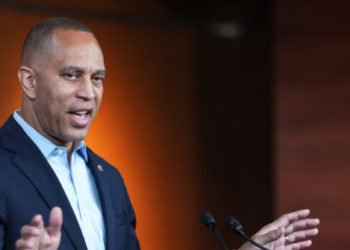When I walk into Luca Guadagnino’s Beverly Hills Hotel suite, he’s hovering over a laptop with production designer Stefano Baisi, who worked with him on After the Hunt and Queer. They’re busy discussing their next movie, Artificial, which stars Andrew Garfield as OpenAI CEO Sam Altman. Guadagnino is in town for screenings of After the Hunt, which opens for a wide release on Friday, following a glitzy August world premiere at the Venice Film Festival.
When I point out that he works at a fast clip, the Italian auteur shrugs it off, pointing out that many of his contemporaries—Yorgos Lanthimos, Wes Anderson, Steven Soderbergh—also average about one film per year, sometimes more. “I personally know if I want to do something and if I want to say something and if I have the means to do it and collaborators to do it with, why not?” he says.
Things were different once. It took Guadagnino six years to make 2009’s I Am Love, his Italian-language drama starring Tilda Swinton as a wealthy woman who has an affair with a chef. “That was a miserable time of my life, and I made a promise to myself of that period: never again,” he says. “I want to be expressing myself. And I’ve been quite lucky and consistent in that regard.”
Guadagnino’s pace has visibly increased since releasing Call Me by Your Name, the film that put Timothée Chalamet on the map, in 2017. With the two movies—Challengers and Queer—that came out in 2024, After The Hunt this year, and Artificial slated for 2026, that’s four movies in the past three years alone.
Though his subject matter ranges from queer coming-of-age dramas to mind games on the tennis court to cannibal love stories (Bones and All), what is consistent is his ambition to push audiences. After the Hunt, in particular, leans into discomfort. The film follows Julia Roberts as Alma, a Yale professor whose student Maggie (Ayo Edebiri) accuses a fellow professor, Hank (Andrew Garfield), of assault. Alma’s carefully constructed life begins to crumble as she grapples with who to believe and chooses not to use her power to help her protégé.
After its Venice debut, After the Hunt sparked plenty of conversation—and one viral moment in which an Italian reporter asked Garfield, Roberts, and Edebiri a tone-deaf question about the end of the Black Lives Matter and #MeToo movements. “I mean, it’s a bit embarrassing, for the part of the journalist,” says Guadagnino. “It’s a little bit tone deaf. This movie wants you to think that it’s better to talk to one another and to listen to one another, instead of going for your route. Probably the journalist had only one idea in her mind, and she couldn’t adapt herself to the moment.”
But After the Hunt is a movie for this moment, says Guadagnino—even if the story is set mostly in 2019, with an epilogue that takes place in the present. Critics have compared it to other films that have tried to capture the post-#MeToo moment, such as Tár, Women Talking, and Bombshell. Guadagnino doesn’t agree with that label; he recently told Variety that this is “a bit of a lazy way to describe it.” But he did aim to reflect the current cultural and political atmosphere.
Though they finished filming in August 2024, Guadagnino didn’t finish the movie’s epilogue until the summer of 2025, after Donald Trump had been reelected and months of national turmoil had already unfolded. In that final scene, Robert’s Alma has recovered from her fall from grace and is now in a position of power once more. “I had this kind of strong intuition that we had to have Alma going up again,” he says. “It sounded kind of extreme, but then look at where we are—look at who went to power again.”
In the epilogue, Alma and Maggie meet at a diner during a snowstorm. Years have passed since their conflict, and each is presenting her best, most improved self. “The two ladies are talking about what happened to their own relationship in a moment where nature is devastating the world and politics are shifting completely and changing the landscape,” Guadagnino says. “So I think for me, this movie is about what we can do to assess a way to listen to one another, more than anything else.”
Guadagnino views his career as a tree with two branches. Some of his films are lifelong passion projects—the movies that he dreamed of making as a kid growing up in Palermo. Suspiria and Queer both fall into that category. Soon, he hopes to adapt Thomas Mann’s 1901 novel Buddenbrooks, which chronicles the gradual decline of a wealthy German merchant dynasty through four generations. He’s so determined to make it that he included the book in After the Hunt, placing a copy on Alma’s bedside table as a sly easter egg. “We’ll see,” he says when I ask him if that’s what’s next. “We’ll wait. It is so timeless that it can wait.”
The other branch is for projects that come along unexpectedly, but feel right. Those include Challengers, After the Hunt, and Artificial—a movie written by Simon Rich that, like After the Hunt, is emphatically contemporary. Guadagnino has learned a great deal about artificial intelligence while making the film, and the emotional baggage that comes along with it. “I know a lot about the people, and I know a lot about the instrument, and I know a lot about the development of it, and I know a lot about the meaning behind the facade,” he says. “So the movie’s going to say that, I hope.”
Guadagnino is less worried about AI’s potential effects on moviemaking than most, despite the recent uproar over an AI “actress” named Tilly Norwood and the newly launched Sora 2 AI Video Generator. “There will always be special effects, visual effects in cinema,” he says. “Sometimes they were groundbreaking—like [the work of] Ray Harryhausen or Phil Tippett. There are many great examples of how technology can be incredible. So I would not discard the technology per se—it’s always about how you do it.”
The night before our chat, I saw Guadagnino at a screening of After the Hunt. The director stuck around afterward to speak with the audience and get their reactions to the film. He’s heard all sorts of theories about After the Hunt following screenings like this, some that have surprised even him. One of his favorites? “That this movie is about [Alma’s husband] Frederik, more than anything else,” he says. “That they catch the idea of the character who is actually a machine that loves and loves for love. I think that’s great, in a way.”
But one thing Guadagnino won’t do during these conversations is reveal his own hand. He won’t tell you who he thinks is guilty of what; he won’t tell you what he thinks happens after the credits roll. His movies are there for audiences to take from them what they will. By this point, his cast of frequent collaborators and those who have followed his career know to stop asking. “I’ve been quite vocal in my life that I always said that I don’t want to explain my movies,” he says. “So they think they know.”
More Great Stories From Vanity Fair
-
What Bari Weiss Means for 60 Minutes
-
All About Melania
-
Meet the British ’90s It Girl Who Wants to Make England Great Again
-
Anjelica Huston’s Cultured Coolness
-
Gore Vidal’s Final Feud
-
The 6 Grisly Films Inspired by Serial Killer Ed Gein
-
Charlie Kirk, Redeemed by the Media
-
The 25 Best Movies to Watch on Netflix This October
-
From the Archive: The Hollywood Secret Katharine Hepburn Helped Bury
The post ‘After the Hunt’ Is Not a #MeToo Movie, Says Luca Guadagnino—but It Is Political appeared first on Vanity Fair.




